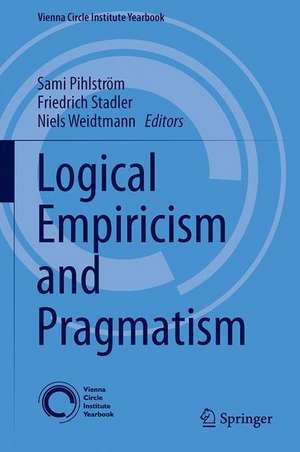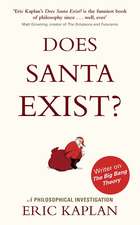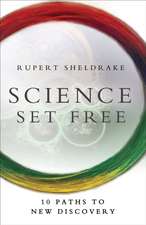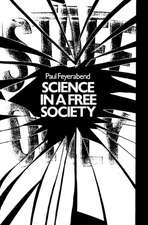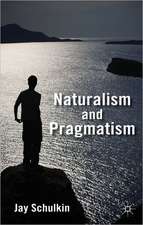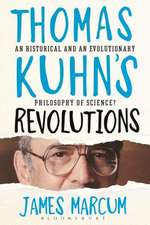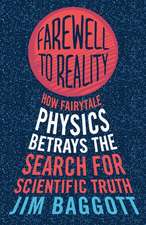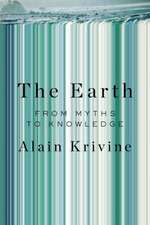Logical Empiricism and Pragmatism: Vienna Circle Institute Yearbook, cartea 19
Editat de Sami Pihlström, Friedrich Stadler, Niels Weidtmannen Limba Engleză Hardback – 13 iun 2017
This work clarifies and specifies the common features and differences of these currents since the beginning of their mutual scientific communication in the 19th century. The book draws on collaboration between authors and philosophers from Vienna, Tübingen, and Helsinki, and their networks. It will appeal to philosophers, scholars in the history of philosophy, philosophers of science, pragmatists and beyond.
| Toate formatele și edițiile | Preț | Express |
|---|---|---|
| Paperback (1) | 638.43 lei 6-8 săpt. | |
| Springer International Publishing – 30 aug 2018 | 638.43 lei 6-8 săpt. | |
| Hardback (1) | 644.63 lei 6-8 săpt. | |
| Springer International Publishing – 13 iun 2017 | 644.63 lei 6-8 săpt. |
Din seria Vienna Circle Institute Yearbook
- 24%
 Preț: 797.66 lei
Preț: 797.66 lei - 18%
 Preț: 964.86 lei
Preț: 964.86 lei - 18%
 Preț: 954.93 lei
Preț: 954.93 lei - 15%
 Preț: 645.47 lei
Preț: 645.47 lei - 15%
 Preț: 644.30 lei
Preț: 644.30 lei - 15%
 Preț: 641.85 lei
Preț: 641.85 lei - 18%
 Preț: 948.16 lei
Preț: 948.16 lei - 15%
 Preț: 636.30 lei
Preț: 636.30 lei - 15%
 Preț: 652.49 lei
Preț: 652.49 lei - 15%
 Preț: 647.59 lei
Preț: 647.59 lei - 18%
 Preț: 953.82 lei
Preț: 953.82 lei - 15%
 Preț: 583.78 lei
Preț: 583.78 lei - 18%
 Preț: 736.16 lei
Preț: 736.16 lei - 18%
 Preț: 1027.20 lei
Preț: 1027.20 lei -
 Preț: 383.71 lei
Preț: 383.71 lei - 18%
 Preț: 788.41 lei
Preț: 788.41 lei - 18%
 Preț: 944.51 lei
Preț: 944.51 lei - 18%
 Preț: 725.43 lei
Preț: 725.43 lei - 18%
 Preț: 950.96 lei
Preț: 950.96 lei - 24%
 Preț: 760.12 lei
Preț: 760.12 lei - 15%
 Preț: 705.51 lei
Preț: 705.51 lei - 18%
 Preț: 954.14 lei
Preț: 954.14 lei - 18%
 Preț: 1391.97 lei
Preț: 1391.97 lei - 18%
 Preț: 959.19 lei
Preț: 959.19 lei - 18%
 Preț: 954.77 lei
Preț: 954.77 lei - 18%
 Preț: 955.40 lei
Preț: 955.40 lei - 18%
 Preț: 954.93 lei
Preț: 954.93 lei
Preț: 644.63 lei
Preț vechi: 758.38 lei
-15% Nou
Puncte Express: 967
Preț estimativ în valută:
123.35€ • 129.11$ • 102.67£
123.35€ • 129.11$ • 102.67£
Carte tipărită la comandă
Livrare economică 31 martie-14 aprilie
Preluare comenzi: 021 569.72.76
Specificații
ISBN-13: 9783319507293
ISBN-10: 331950729X
Pagini: 270
Ilustrații: VIII, 245 p.
Dimensiuni: 155 x 235 mm
Greutate: 0.54 kg
Ediția:1st ed. 2017
Editura: Springer International Publishing
Colecția Springer
Seria Vienna Circle Institute Yearbook
Locul publicării:Cham, Switzerland
ISBN-10: 331950729X
Pagini: 270
Ilustrații: VIII, 245 p.
Dimensiuni: 155 x 235 mm
Greutate: 0.54 kg
Ediția:1st ed. 2017
Editura: Springer International Publishing
Colecția Springer
Seria Vienna Circle Institute Yearbook
Locul publicării:Cham, Switzerland
Cuprins
Chapter 1 Ernst Mach and Pragmatism – The Case of Mach’s Popular Scientific Lectures (1895)( Friedrich Stadler).- Chapter 2 William James and the Vienna Circle (Massimo Ferrari).- Chapter 3 Classical Pragmatism and Metaphysics:James and Peirce on Scientific Determinism(Donata Romizi).- Chapter 4 Beyond Realism and Antirealism? The strange case of Dewey’s Instrumentalism (Giovanni Rubeis).- Chapter 5 American Pragmatism, Central-European Pragmatism and the First Vienna Circle(Thomas Uebel).- Chapter 6 On Rational Restraints of Ontology(Heikki J. Koskinen).- Chapter 7 Feigl, Sellars, and the Idea of a “Pure Pragmatics”( Matthias Neuber).- Chapter 8 On the Viennese Background of Harvard Neopragmatism(Sami Pihlström).- Chapter 9 The ghost of pragmatism.Some historical remarks on the foundations of probability debate(Maria Carla Galavotti).- Chapter 10 21st Vienna Circle Lecture.- Chapter 11 Review Essay.- Chapter 12 Report/ Documentation.- Reviews
Notă biografică
Sami Pihlström is Professor of Philosophy of Religion at the University of Helsinki, Finland. He was previously (2009-2015) the Director of the Helsinki Collegium for Advanced Studies. Currently he also serves as the Vice-Chair of the Research Council for Culture and Society at the Academy of Finland, and as the President of the Philosophical Society of Finland. He is in charge of the research group, "Contemporary Philosophy of Religion", within the Academy of Finland Centre of Excellence, "Reason and Religious Recognition", at the Faculty of Theology, University of Helsinki. He has published widely on pragmatism, realism, transcendental philosophy, metaphysics, ethics, and philosophy of religion.
Friedrich Stadler is Professor for History and Philosophy of Science at the University of Vienna. In 1991 Founder and since then Head of the Institute Vienna Circle/Institut Wiener Kreis, which became a Department at the Faculty of Philosophy and Education of the University of Vienna in 2011. Guest professorships at the Humboldt University Berlin, University of Minnesota und Universität Helsinki (Helsinki Collegium for Advanced Studies). 2009-2013 President of the European Philosophy of Science Association (EPSA). 2005-2014 Member of the Board of the Austrian Science Fund (FWF). Head of the Commission for the Research of the History of the University of Vienna and Head of the Rectorate’s Project “Forum Contemporary History of the University of Vienna”.Research and publications on modern history and philosophy of science, intellectual history, emigration and exile studies and historical science studies. Member of the FWF doctoral program „The Sciences in Historical, Philosophical, and Cultural Contexts“, coordinator of the interdisciplinary MA study program “History and Philosophy of Science (MA HPS).Author of books on Ernst Mach and the Vienna Circle, many publications in these fields. Editor of books and articles in several languages. Editor 3book series with Springer.
Niels Weidtmann is director of the Forum Scientiarum, an institute for interdisciplinary studies, of Tübingen University, Germany, and assistant lecturer at the philosophy department of Tübingen University. He has studied philosophy, politics and biology at the University of Würzburg, Germany, and at Duke-University in Durham, N.C., USA. His research interests focus on phenomenology, intercultural philosophy, philosophical anthropology and philosophy of science. He has published widely on these topics and is editor of different book series.
Friedrich Stadler is Professor for History and Philosophy of Science at the University of Vienna. In 1991 Founder and since then Head of the Institute Vienna Circle/Institut Wiener Kreis, which became a Department at the Faculty of Philosophy and Education of the University of Vienna in 2011. Guest professorships at the Humboldt University Berlin, University of Minnesota und Universität Helsinki (Helsinki Collegium for Advanced Studies). 2009-2013 President of the European Philosophy of Science Association (EPSA). 2005-2014 Member of the Board of the Austrian Science Fund (FWF). Head of the Commission for the Research of the History of the University of Vienna and Head of the Rectorate’s Project “Forum Contemporary History of the University of Vienna”.Research and publications on modern history and philosophy of science, intellectual history, emigration and exile studies and historical science studies. Member of the FWF doctoral program „The Sciences in Historical, Philosophical, and Cultural Contexts“, coordinator of the interdisciplinary MA study program “History and Philosophy of Science (MA HPS).Author of books on Ernst Mach and the Vienna Circle, many publications in these fields. Editor of books and articles in several languages. Editor 3book series with Springer.
Niels Weidtmann is director of the Forum Scientiarum, an institute for interdisciplinary studies, of Tübingen University, Germany, and assistant lecturer at the philosophy department of Tübingen University. He has studied philosophy, politics and biology at the University of Würzburg, Germany, and at Duke-University in Durham, N.C., USA. His research interests focus on phenomenology, intercultural philosophy, philosophical anthropology and philosophy of science. He has published widely on these topics and is editor of different book series.
Textul de pe ultima copertă
This book explores the complexity of two philosophical traditions, extending from their origins to the current developments in neopragmatism. Chapters deal with the first encounters of these traditions and beyond, looking at metaphysics and the Vienna circle as well as semantics and the principle of tolerance. There is a general consensus that North-American (neo-)pragmatism and European Logical Empiricism were converging philosophical traditions, especially after the forced migration of the European Philosophers. But readers will discover a pluralist image of this relation and interaction with an obvious family resemblance.
This work clarifies and specifies the common features and differences of these currents since the beginning of their mutual scientific communication in the 19th century. The book draws on collaboration between authors and philosophers from Vienna, Tübingen, and Helsinki, and their networks. It will appeal to philosophers, scholars in the history of philosophy, philosophers of science, pragmatists and beyond.
This work clarifies and specifies the common features and differences of these currents since the beginning of their mutual scientific communication in the 19th century. The book draws on collaboration between authors and philosophers from Vienna, Tübingen, and Helsinki, and their networks. It will appeal to philosophers, scholars in the history of philosophy, philosophers of science, pragmatists and beyond.
Caracteristici
Provides a fresh picture of the relations between pragmatism and logical empiricism Explores the relation of pragmatism and logical empiricism from an historical and philosophical point of view Traces the development of influential theory from related philosophical traditions Draws on international, interdisciplinary and collaborative work
